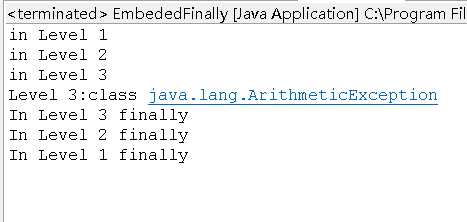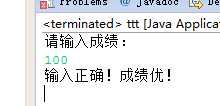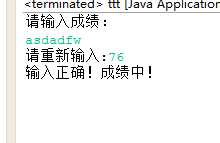标签:throw 输入 ati 无效 exception 没有 parse mat bre
import javax.swing.*; class AboutException { public static void main(String[] a) { double i=-1, j=0, k; k=i/j; try { k = i/j; // Causes division-by-zero exception //throw new Exception("Hello.Exception!"); } catch ( ArithmeticException e) { System.out.println("被0除. "+ e.getMessage()); } catch (Exception e) { if (e instanceof ArithmeticException) System.out.println("被0除"); else { System.out.println(e.getMessage()); } } finally { JOptionPane.showConfirmDialog(null,"OK "+k); //JOptionPane.showInternalConfirmDialog(null, k); } } }
Try{
//可能发生运行错误的代码;
}
catch(异常类型 异常对象引用){
//用于处理异常的代码
}
finally{
//用于“善后” 的代码
}
Java 中所有可捕获的异常都派生自 Exception 类。
使用Java异常处理机制
1、Java 中所有可捕获的异常都派生自 Exception 类。
2、把可能会发生错误的代码放进try语句块中。
3、当程序检测到出现了一个错误时会抛出一个异常对象。异常处理代码会捕获并处理这个错误。 catch语句块中的代码用于处理错误。
4、当异常发生时,程序控制流程由try语句块跳转到catch语句块。
5、不管是否有异常发生,finally语句块中的语句始终保证被执行。
6、如果没有提供合适的异常处理代码,JVM将会结束掉整个应用程序。
public class CatchWho { public static void main(String[] args) { try { try { throw new ArrayIndexOutOfBoundsException(); } catch(ArrayIndexOutOfBoundsException e) { System.out.println( "ArrayIndexOutOfBoundsException" + "/内层try-catch"); } throw new ArithmeticException(); } catch(ArithmeticException e) { System.out.println("发生ArithmeticException"); } catch(ArrayIndexOutOfBoundsException e) { System.out.println( "ArrayIndexOutOfBoundsException" + "/外层try-catch"); } } }
实验结果截图、

动手动脑4:当有多个嵌套的try…catch…finally时,要特别注意finally的执行时机。
请先阅读 EmbedFinally.java示例,再运行它,观察其输出并进行总结。
特别注意:
当有多层嵌套的finally时,异常在不同的层次抛出 ,在不同的位置抛出,可能会导致不同的finally语句块执行顺序。
public class EmbededFinally { public static void main(String args[]) { int result; try { System.out.println("in Level 1"); try { System.out.println("in Level 2"); // result=100/0; //Level 2 try { System.out.println("in Level 3"); result=100/0; //Level 3 } catch (Exception e) {//exception异常 System.out.println("Level 3:" + e.getClass().toString()); } finally { System.out.println("In Level 3 finally"); } // result=100/0; //Level 2 } catch (Exception e) { System.out.println("Level 2:" + e.getClass().toString()); } finally { System.out.println("In Level 2 finally"); } // result = 100 / 0; //level 1 } catch (Exception e) { System.out.println("Level 1:" + e.getClass().toString()); } finally { System.out.println("In Level 1 finally"); } } }
实验结果截图、

当有多层嵌套的finally时,异常在不同的层次抛出 ,在不同的位置抛出,可能会导致不同的finally语句块执行顺序。
public class SystemExitAndFinally { public static void main(String[] args) { try{ System.out.println("in main"); throw new Exception("Exception is thrown in main"); //System.exit(0); } catch(Exception e) { System.out.println(e.getMessage()); System.exit(0); } finally { System.out.println("in finally"); } } }

try语句没有被执行到,如在try语句之前return就返回了,这样finally语句就不会执行。这也说明了finally语句被执行的必要而非充分条件是:相应的try语句一定被执行到。
在try块|catch块中有System.exit(0);这样的语句。System.exit(0)是终止Java虚拟机JVM的,连JVM都停止了,所有都结束了,当然finally语句也不会被执行到。
在try-catch-finally中, 当return遇到finally,return对finally无效
编写一个程序,此程序在运行时要求用户输入一个 整数,代表某门课的考试成绩,程序接着给出“不及格”、“及格”、“中”、“良”、“优”的结论。
要求程序必须具备足够的健壮性,不管用户输入什 么样的内容,都不会崩溃。
import java.util.*;
public class ttt {
public static void main(String[] args) {
Scanner sc=new Scanner(System.in);
String pro;
System.out.println("请输入成绩:");
while(true){
try{
pro=sc.nextLine();
if(pro.matches("\\D*")){
throw new InException("输入有误!不是的不是数字!");
}
else{
int proo=Integer.parseInt(pro);
System.out.print("输入正确!");
judge(proo);
break;
}
}
catch(InException e){
System.out.print("请重新输入:");
}
}
sc.close();
}
public static void judge(int pro){
if(pro>=0&&pro<60)
System.out.println("成绩不合格!");
else if(pro<70)
System.out.println("成绩合格!");
else if(pro<80)
System.out.println("成绩中!");
else if(pro<90)
System.out.println("成绩良!");
else if(pro<=100)
System.out.println("成绩优!");
else
System.out.println("输入成绩不符");
}
}
class InException extends Exception{//
public InException(String msg){
super(msg);
}
}


标签:throw 输入 ati 无效 exception 没有 parse mat bre
原文地址:http://www.cnblogs.com/xhxdeblog/p/6102662.html